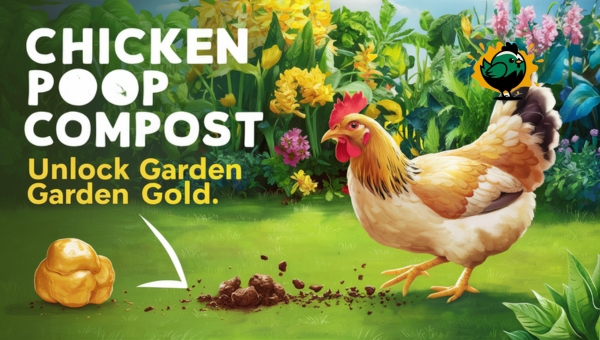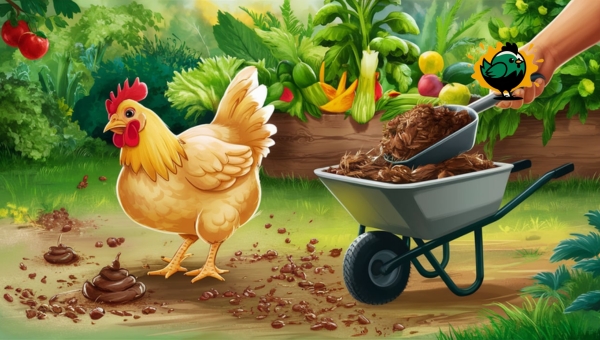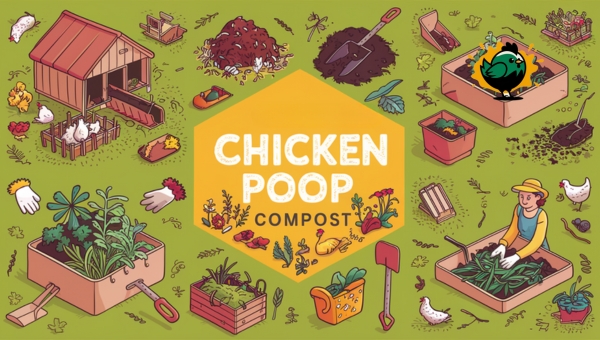Chicken Poop Compost – Unlock Garden Gold

Imagine stepping into a garden bursting with life, colors, and scents. The secret? Chicken poop compost. This natural fertilizer transforms garden soil into a nutrient-rich haven. Picture a backyard where waste turns into wonder. With each cluck and scratch, chickens contribute to a thriving ecosystem.
Their droppings, often overlooked, are perfect for composting. This article unveils the benefits and guides you through the process. Learn how to harness chicken manure for your garden’s success. From collection to compost pile, discover the steps to create your own garden gold. Dive into the world of chicken poop compost and watch your plants flourish like never before.
Understanding Chicken Poop Compost
Chicken poop compost is a valuable resource for gardeners and farmers, providing a rich source of nutrients that can enhance soil health. This compost is made from chicken manure, which is high in nitrogen, phosphorus, and potassium.

These nutrients are essential for plant growth, making chicken poop compost an excellent fertilizer. When properly composted, chicken manure can improve soil structure, increase water retention, and promote healthy root development.
It’s important to note that fresh chicken manure should not be applied directly to plants, as it can burn them due to its high nitrogen content. Instead, composting the manure first ensures it is safe and effective for use in gardens. By incorporating chicken poop compost into your gardening routine, you can foster a thriving and productive growing environment.
Benefits of Using Chicken Poop in Compost
Chicken poop compost offers several advantages for your garden and plants.
- Rich in Nutrients: Chicken manure is packed with nitrogen, phosphorus, and potassium, which are essential for plant growth.
- Improves Soil Structure: The organic matter in chicken poop helps improve soil aeration and water retention.
- Environmentally Friendly: Recycling chicken manure into compost reduces waste and promotes sustainable gardening practices.
- Increases Microbial Activity: The composting process boosts beneficial microbes in the soil, enhancing plant health.
- Cost-Effective: Using chicken manure as compost can reduce the need for chemical fertilizers, saving money in the long run.
- Versatile Use: Chicken poop compost can be used in vegetable gardens, flower beds, and lawns, making it a versatile addition to any garden.
Also Read: Decorating Inside Chicken Coop – Transform Your Space
How to Make Chicken Poop Compost?
Creating chicken poop compost is a rewarding process that improves your garden’s health. Let’s explore the steps involved in gathering and storing manure, creating a compost pile, and monitoring the compost process to ensure success.

Gathering and Storing Manure
Collecting chicken manure properly is the first step in composting. Here are some best practices:
- Regular Collection: Gather the manure frequently to prevent odor buildup and maintain a clean coop.
- Storage Containers: Use sealed containers to store the manure temporarily, reducing odor and preventing flies.
- Mix with Bedding: Combine manure with bedding material like straw or wood shavings to balance moisture and enhance composting.
Creating a Compost Pile
Starting a compost pile with chicken poop requires careful layering and attention to detail for optimal results. Follow these steps:
- Select a Location: Choose a well-drained spot in your garden, away from direct sunlight and water sources.
- Layering: Begin with a base layer of coarse materials like twigs to allow airflow. Add a layer of chicken poop mixed with bedding.
- Alternate Layers: Continue layering organic materials such as grass clippings and leaves with the chicken manure.
- Moisture Balance: Maintain moisture by lightly watering the pile if it feels dry, but avoid waterlogging.
- Cover the Pile: Use a tarp or similar cover to maintain moisture and prevent pests.
Monitoring and Turning the Compost
Regular monitoring and turning of the compost pile are essential to ensure it decomposes effectively. Here’s how you can manage it:
- Temperature Check: Use a compost thermometer to monitor the internal temperature, aiming for 130-150°F for optimal decomposition.
- Turning the Pile: Every few weeks, turn the compost with a pitchfork to introduce oxygen, which speeds up the process.
- Moisture and Odor: Keep the pile moist but not soggy, and address any unpleasant smells by adjusting the material balance.
Potential Challenges and Solutions
When making chicken poop compost, certain challenges might arise. These challenges can include unpleasant odors and the presence of harmful pathogens.
Understanding these issues and knowing how to tackle them is crucial for a successful composting process. Let’s explore some potential challenges and the solutions you can apply.
Managing Odor
Odor is a common concern when dealing with chicken manure. The smell can become overwhelming if not managed properly.
To effectively handle odors:
- Aeration: Regularly turning the compost pile helps to introduce oxygen, reducing odor-causing bacteria.
- Carbon-Rich Materials: Add materials like straw or dry leaves to balance nitrogen-rich chicken poop, which helps in minimizing odors.
- Proper Moisture Levels: Ensure the compost is moist but not too wet, as excess moisture can lead to bad smells.
Handling Pathogens
Chicken manure may contain pathogens that need cautious handling. Ensuring safety in composting is vital:
- Temperature Monitoring: Maintain a compost temperature of around 130-150°F to kill most pathogens.
- Composting Duration: Allow the compost to mature for several months to ensure pathogens are broken down.
- Protective Gear: Use gloves and masks when handling manure to prevent direct contact with harmful bacteria.
Also Read: Jersey Giant Chicken – Discover This Remarkable Breed
Tips for Successful Chicken Poop Composting
To achieve the best results in chicken poop composting, it’s key to follow a few practical strategies. These tips will help you enhance the efficiency and success of your composting process.
- Balance Ingredients: Combine chicken manure with other compost materials like leaves, straw, or grass clippings to create a well-balanced mixture. This ensures the compost has the right mix of carbon and nitrogen.
- Maintain Moisture: Keep the compost pile damp, but not soggy. This aids the decomposition process and supports beneficial microorganisms.
- Turn Regularly: Aerate the compost by turning it every few weeks. This introduces oxygen, speeds up decomposition, and prevents odor.
- Monitor Temperature: A hot compost pile (between 130°F and 150°F) indicates active decomposition. Use a compost thermometer to check regularly.
- Ensure Adequate Space: Allocate enough space for the compost pile to grow as more materials are added. This allows for better management and turning.
Conclusion
Chicken poop compost is a valuable resource for enhancing garden soil with essential nutrients. By understanding the process of composting chicken manure, gardeners can produce a compost that enriches the soil, boosts plant growth, and supports sustainable gardening practices.
It’s important to regularly monitor and turn the compost pile to achieve optimal results. Proper management of potential challenges, such as odor and pathogens, ensures a safe and effective composting process. With these strategies, chicken manure can become a powerful tool in your gardening toolkit.
Explore more insightful gardening tips and tricks by visiting our blog. Stay informed and elevate your gardening experience!
